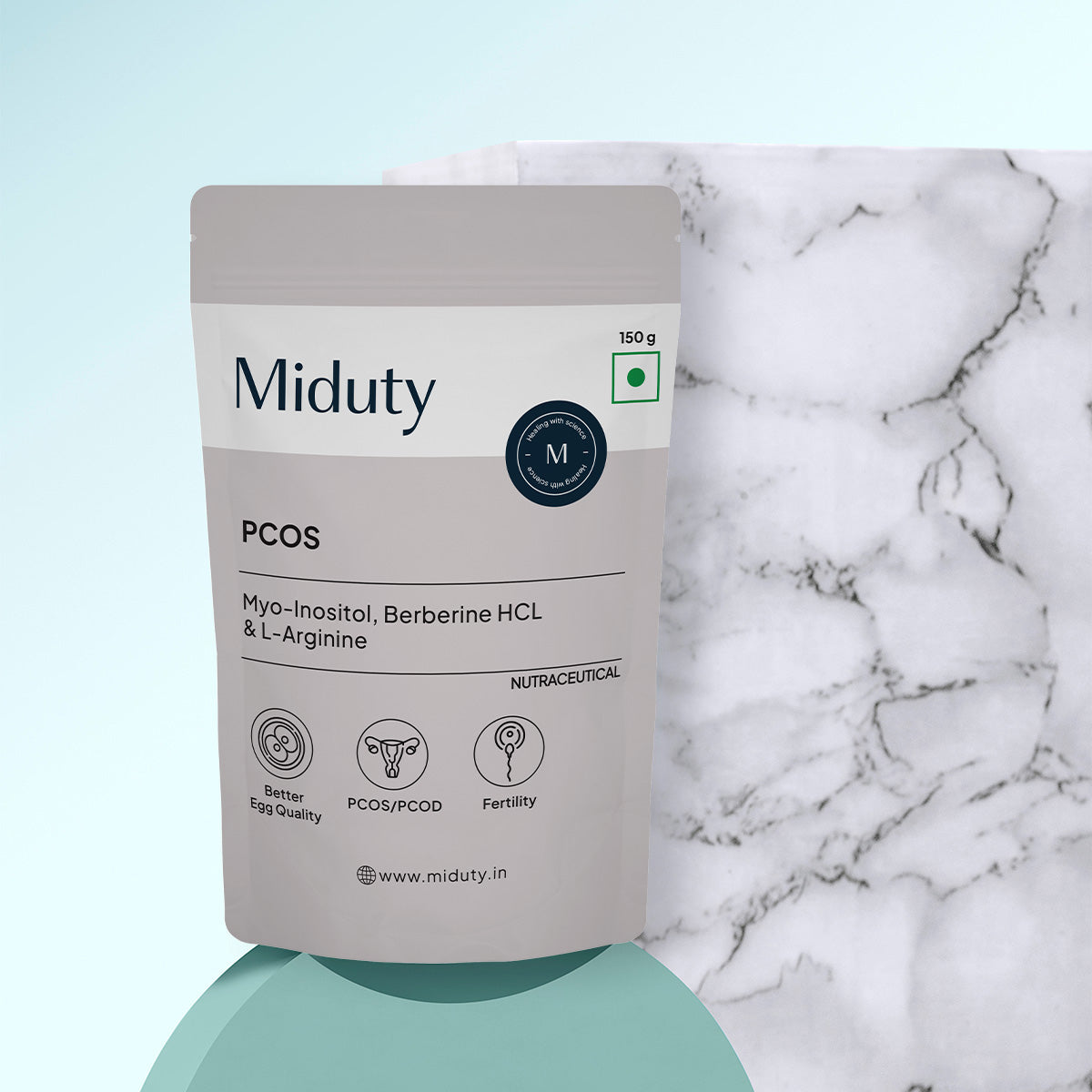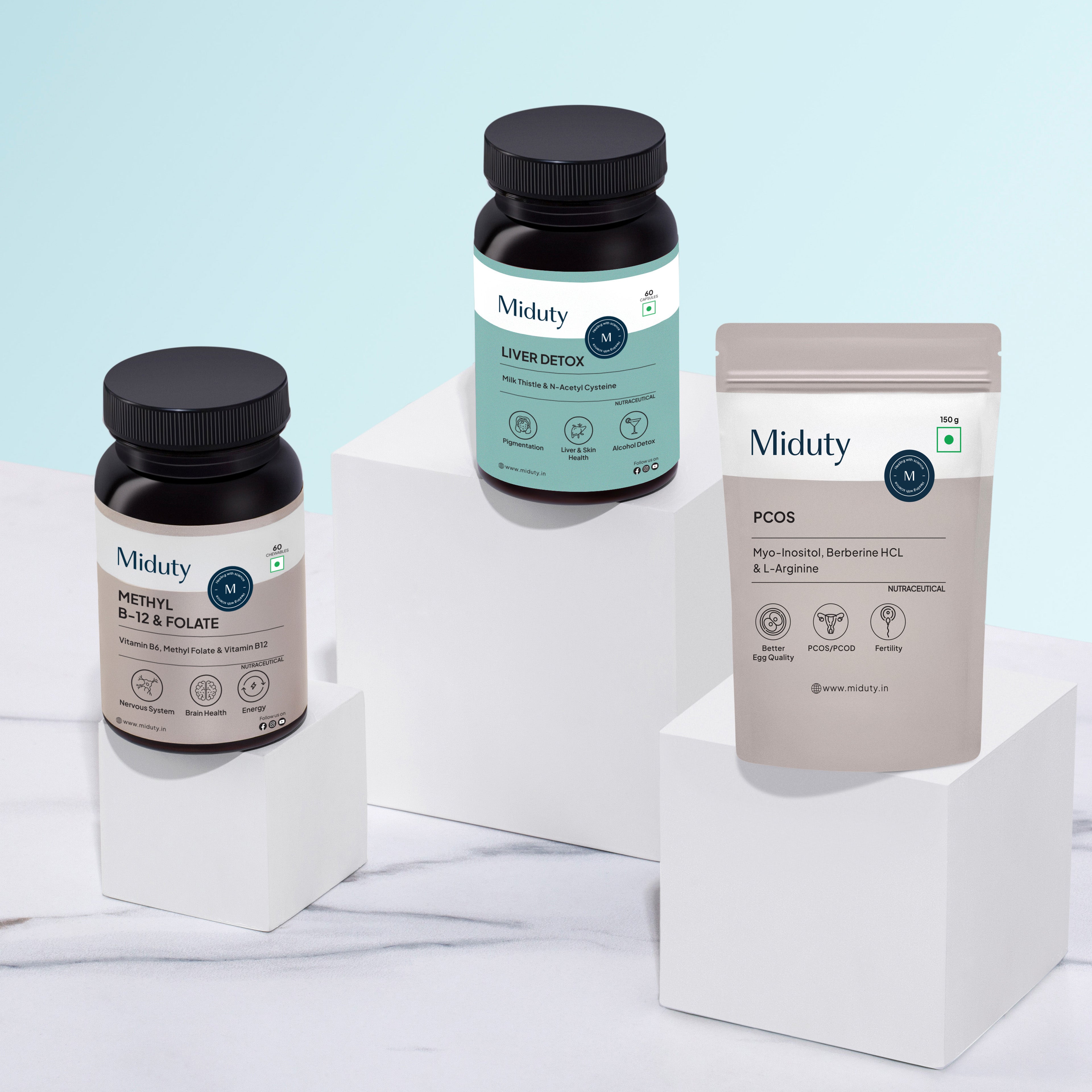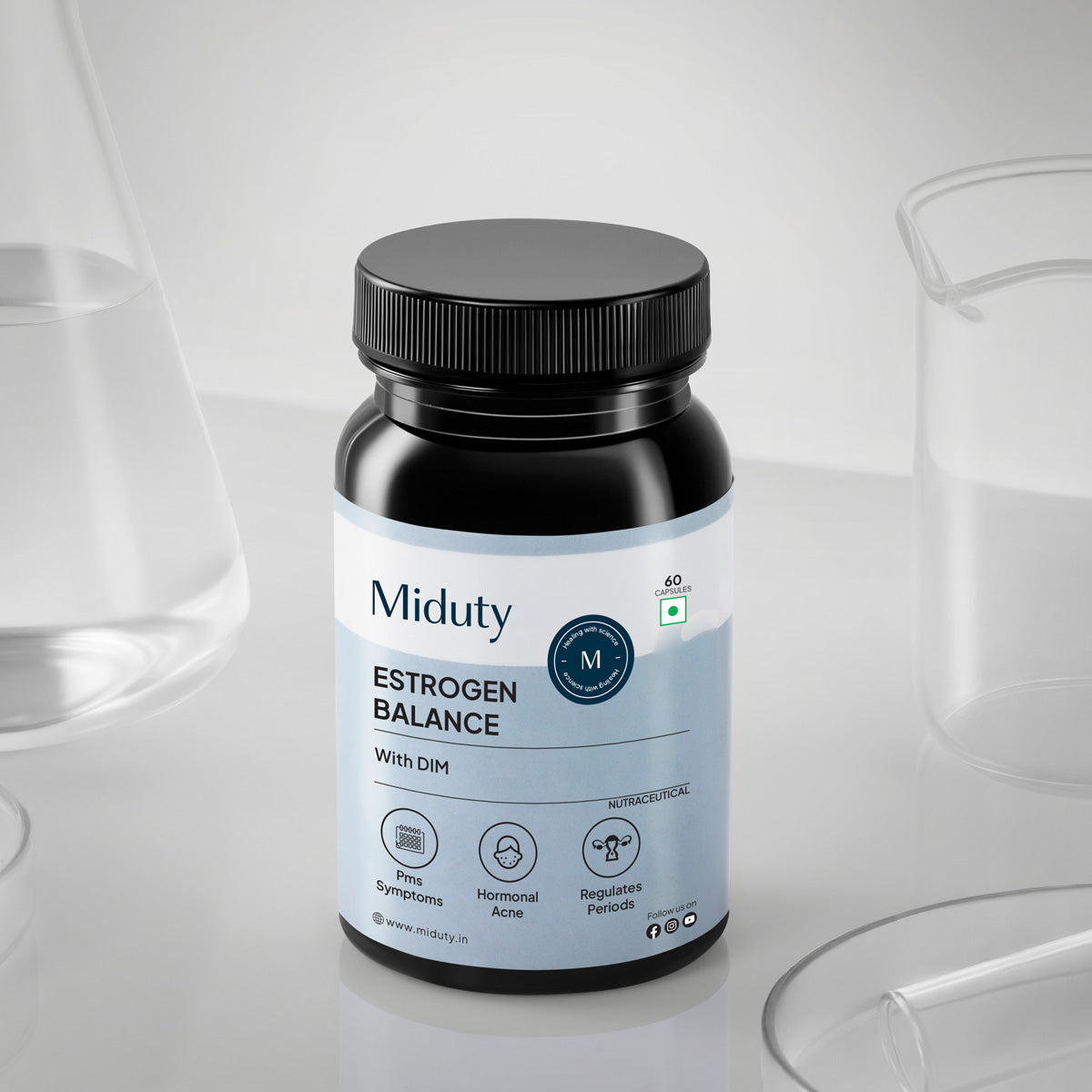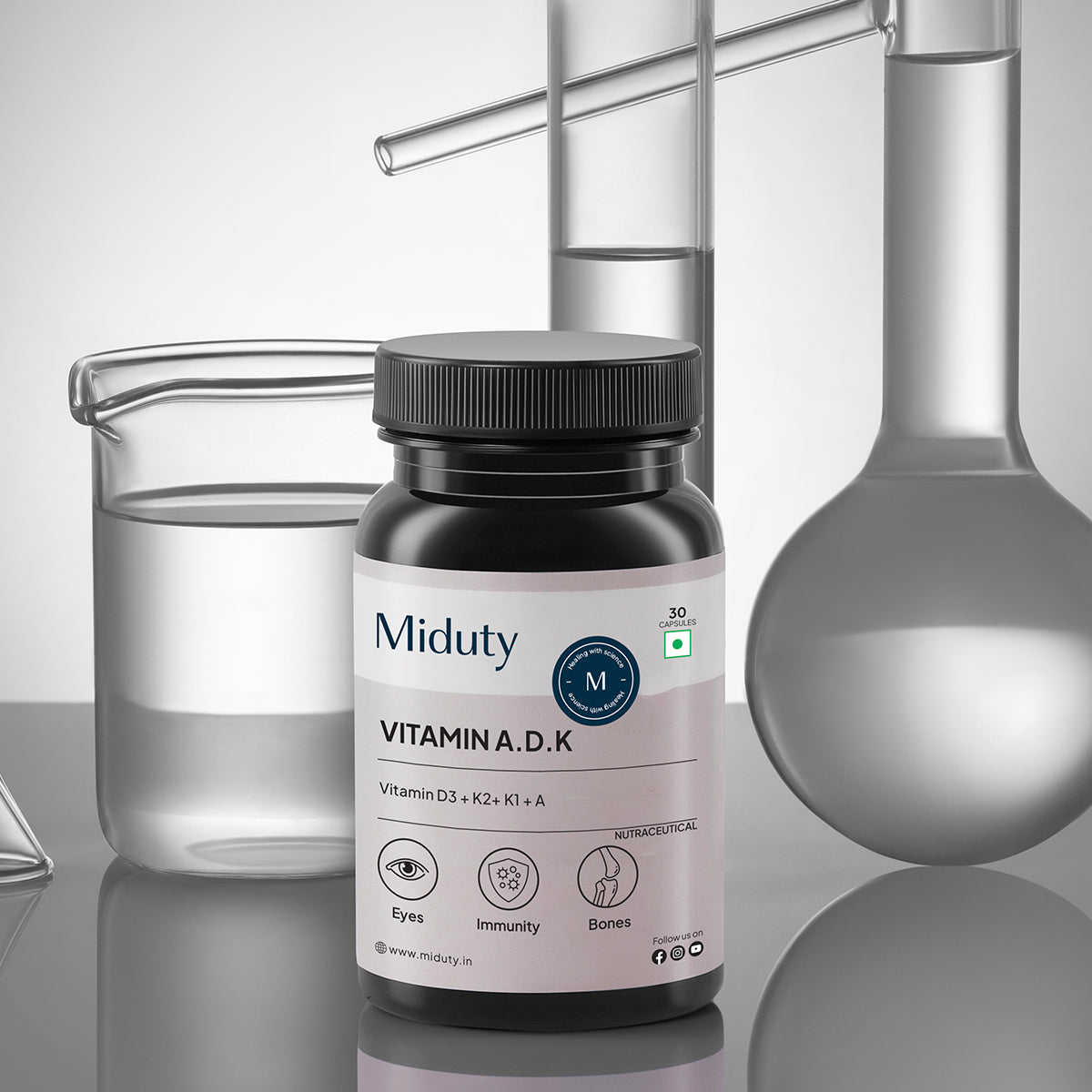
PCOS vs PCOD: Symptoms, Key Differences, and Home Remedies
Every 1 in 5 women is suffering from hormonal imbalance, irregular periods, facial hair, ovarian cysts, and so on. But only a few women know if they have Polycystic Ovary Syndrome (PCOS) or Polycystic Ovarian Disease (PCOD).
Both of these terms are often used interchangeably, but they are not exactly the same. While both conditions are related to the ovaries and affect women's hormonal health, there are significant differences between them that impact diagnosis, treatment, and long-term health.
Confused about what sets them apart? Let's dive deep into the details and understand how PCOS and PCOD differ from each other.
What is PCOS (Polycystic Ovary Syndrome)?
PCOS is a complex hormonal disorder that affects women of reproductive age. It's more than just an ovarian issue; it's a metabolic and endocrine problem that can impact the entire body. Women with PCOS often experience irregular menstrual cycles, excess androgen (male hormones), and polycystic ovaries visible on ultrasound.
But here's the kicker-despite the name, you don't need to have cysts on your ovaries to be diagnosed with PCOS. The condition is diagnosed based on symptoms, hormonal levels, and sometimes ultrasound findings. PCOS is known to disrupt ovulation, making it one of the leading causes of infertility among women.
Moreover, PCOS is linked with insulin resistance, obesity, type 2 diabetes, and cardiovascular risks. It's NOT just a "reproductive" disorder but a lifelong metabolic challenge that requires ongoing management.
What is PCOD (Polycystic Ovarian Disease)?
PCOD, on the other hand, is more of an ovarian disorder where the ovaries release immature or partially mature eggs, which eventually turn into cysts. Unlike PCOS, PCOD is considered less severe and is more of a lifestyle-induced condition rather than a full-blown endocrine disorder.
Women with PCOD might experience irregular periods, mild hormonal imbalances, and weight fluctuations. However, the symptoms are often less severe, and fertility is usually not as severely affected as in PCOS cases.
In PCOD, lifestyle changes like weight loss, exercise, and a healthy diet can significantly improve symptoms. While PCOD can cause discomfort, it's not considered as chronic or serious as PCOS from a long-term health perspective.
Key Differences Between PCOS and PCOD
Medical Definition and Diagnosis
PCOS, or Polycystic Ovary Syndrome, is recognized as a metabolic-endocrine disorder that affects multiple systems in the body. Its diagnosis typically follows the Rotterdam criteria, which require a woman to meet at least two of the following conditions:
- Irregular ovulation or complete absence of ovulation (anovulation),
- Clinical or biochemical signs of hyperandrogenism (such as excess facial hair or high testosterone levels),
- The presence of polycystic ovaries, visible in an ultrasound.
These factors highlight PCOS as a more complex and systemic health issue, going beyond just ovarian problems.
On the other hand, PCOD, or Polycystic Ovarian Disease, is primarily considered a functional disorder of the ovaries. In PCOD, the ovaries produce multiple immature eggs that eventually develop into small cysts. Diagnosis is often made through ultrasound imaging, along with clinical observation of menstrual irregularities.
Unlike PCOS, PCOD is viewed more as a localized issue with the ovaries, without the widespread metabolic implications seen in PCOS.
Hormonal Imbalances: PCOS vs PCOD
Hormonal imbalance is a key distinguishing factor between PCOS and PCOD. In PCOS, the hormonal disruptions are much more severe and widespread. Women with PCOS may show hormonal or metabolic fluctuations like:
- Elevated levels of androgens, such as testosterone, leading to visible symptoms like hirsutism and acne.
- Increased LH (Luteinizing Hormone) to FSH (Follicle-Stimulating Hormone) ratio, which interferes with normal ovulation.
- Insulin resistance, making women more prone to developing type 2 diabetes,
- Metabolic syndrome features like obesity and high cholesterol.
In contrast, PCOD is characterized by milder hormonal fluctuations. There might be a slight increase in androgen levels, but it is usually not as pronounced as in PCOS. Hormonal imbalances in PCOD are often the result of lifestyle factors such as poor diet, lack of exercise, and stress. Insulin resistance is not always present in PCOD cases, making it less of a metabolic concern.
Essentially, PCOD represents a more temporary, lifestyle-induced hormonal disturbance, whereas PCOS signifies a deeper, systemic hormonal imbalance.
Symptoms Comparison: PCOS vs PCOD
|
Symptoms |
PCOS |
PCOD |
|
Menstrual irregularity |
Severe, sometimes absence of periods |
Mild to moderate irregularity |
|
Weight gain |
Often significant and stubborn |
Mild, reversible with lifestyle changes |
|
Acne and hair growth |
Prominent due to high androgen levels |
Less severe, occasional flare-ups |
|
Infertility |
Common and requires medical intervention |
Rare, usually reversible with weight management |
|
Metabolic complications |
High risk of diabetes, hypertension, and heart disease |
Minimal long-term health risks |
|
Mood disorders |
Anxiety, depression, and eating disorders prevalent |
Mild emotional stress linked to hormonal changes |
Lifestyle Modifications for PCOS and PCOD
The first line of defense against both PCOS and PCOD is lifestyle modification. Doctors worldwide emphasize the importance of:
1. Healthy Diet: A healthy diet for managing insulin resistance includes foods that are high in fiber, low in processed carbohydrates, and rich in healthy fats.
- High-fiber foods, for example, vegetables (like broccoli, carrots, spinach), legumes (like lentils, chickpeas), help slow down the absorption of sugar and improve blood sugar control.
- Foods low in processed carbohydrates mean avoiding foods that cause rapid spikes in blood sugar.
Examples of what to avoid: White bread, sugary snacks, pastries, soda, instant noodles, and white rice.
Instead, choose: millet (like bajra or jowar), or sweet potatoes. - Healthy fats support insulin sensitivity and keep you full longer. You can take Desi ghee (in moderation – great source of CLA and butyric acid), Pumpkin seeds (rich in magnesium and zinc), Nuts like almonds and walnuts, Avocados, Fatty fish like salmon or sardines (if non-vegetarian).
2. Regular Exercise: At least 30 minutes of moderate exercise, 5 days a week, to improve insulin sensitivity and aid weight loss.
3. Stress Management: Yoga, meditation, and mindfulness can help regulate hormonal balance.
4. Sleep Hygiene: Quality sleep is essential for hormonal regulation.
Lifestyle changes have shown dramatic improvements, especially in PCOD cases, often reversing symptoms without medication.
Supplementation for Managing PCOS and PCOD
For women struggling with PCOS or PCOD, a gentle, consistent approach through nutritional supplements can go a long way in easing symptoms and restoring hormonal balance. Unlike harsh medications, these work in sync with the body and are easy to incorporate into daily life.
1. Myo-Inositol + D-Chiro Inositol: Clinically shown to improve ovulation, regulate cycles, and reduce insulin resistance.
2. Ashwagandha Extract: Helps manage high cortisol levels, supporting better mood, sleep, and overall hormonal health.
3. Omega-3 Fatty Acids: Reduces inflammation and may lower elevated androgen levels.
4. Vitamin D3 + K2: Crucial for hormonal function, especially in women with PCOS who are often deficient.
5. NAC (N-Acetylcysteine): A powerful antioxidant that can help reduce testosterone levels and improve fertility outcomes.
Simple Home Remedies for PCOS and PCOD
Dealing with PCOS or PCOD doesn't always require complicated treatments-sometimes, relief starts right at home. Simple, natural habits and kitchen remedies can gently support hormonal balance, reduce symptoms, and boost overall well-being when practiced consistently.
- Fenugreek Seed Water: Drinking it on an empty stomach may aid in stabilizing blood sugar and reducing bloating.
- Aloe Vera Juice (unsweetened): Supports liver detoxification and may help reduce inflammation naturally.
- Spearmint Herbal Tea: Consuming it regularly may assist in lowering androgen activity and improving skin clarity.
- Seed Cycling: A natural method using flax, pumpkin, sesame, and sunflower seeds to support different phases of the menstrual cycle.
- Hydration & Herbal Infusions: Drinking enough water and using herbs like tulsi or chamomile can support adrenal health and reduce PMS-related stress.
- Digital Detox Before Bed: Lowering screen time supports melatonin production, which indirectly helps regulate sleep and hormones.
Conclusion
While PCOS and PCOD may seem similar at first glance, they are fundamentally different in their causes, severity, and impact on health. PCOS is a complex metabolic-endocrine disorder with far-reaching health implications, whereas PCOD is often a lifestyle-related ovarian dysfunction. Early diagnosis, proper medical care, and consistent lifestyle management are key to living a healthy life with either condition.
The journey with PCOS or PCOD can be challenging, but with the right knowledge, support, and proactive measures, it is entirely possible to manage symptoms and lead a fulfilling life. Remember, every woman's body is different-personalized care is the cornerstone of effective treatment.
Frequently Asked Questions on PCOS vs PCOD -
Q1: Which is more serious, PCOD or PCOS?
PCOS is generally more serious than PCOD. It involves a complex hormonal imbalance that can affect multiple systems in the body and may lead to complications like infertility, insulin resistance, and metabolic issues. PCOD is often milder and mostly influenced by lifestyle, making it easier to manage.
Q2: Can PCOD be cured permanently?
While there is no permanent cure, PCOD can be effectively controlled and even reversed with the right lifestyle changes. A healthy diet, regular exercise, weight management, and stress reduction can help regulate hormones and restore normal ovulation in most cases.
Q3: Can a person have both PCOS and PCOD?
Technically, no. A person is usually diagnosed with either PCOD or PCOS, not both. However, since the symptoms can overlap-like irregular periods or weight gain-it's easy to confuse the two. A proper diagnosis through hormonal tests and ultrasound helps clarify the condition.
Q4: How to differentiate between PCOD and PCOS?
PCOD is mainly due to lifestyle factors and usually doesn't cause major hormonal imbalance. PCOS, on the other hand, involves more serious endocrine issues. PCOS often includes high androgen levels, insulin resistance, and risk of long-term complications, whereas PCOD mostly presents with irregular cycles and multiple immature eggs in the ovaries.
Q5: Can a PCOD girl get pregnant?
Yes, absolutely! Most women with PCOD can conceive naturally with some lifestyle adjustments. Maintaining a healthy weight, eating a balanced diet, and managing stress are key. If needed, fertility support through medication or mild treatments can help improve the chances.
References















